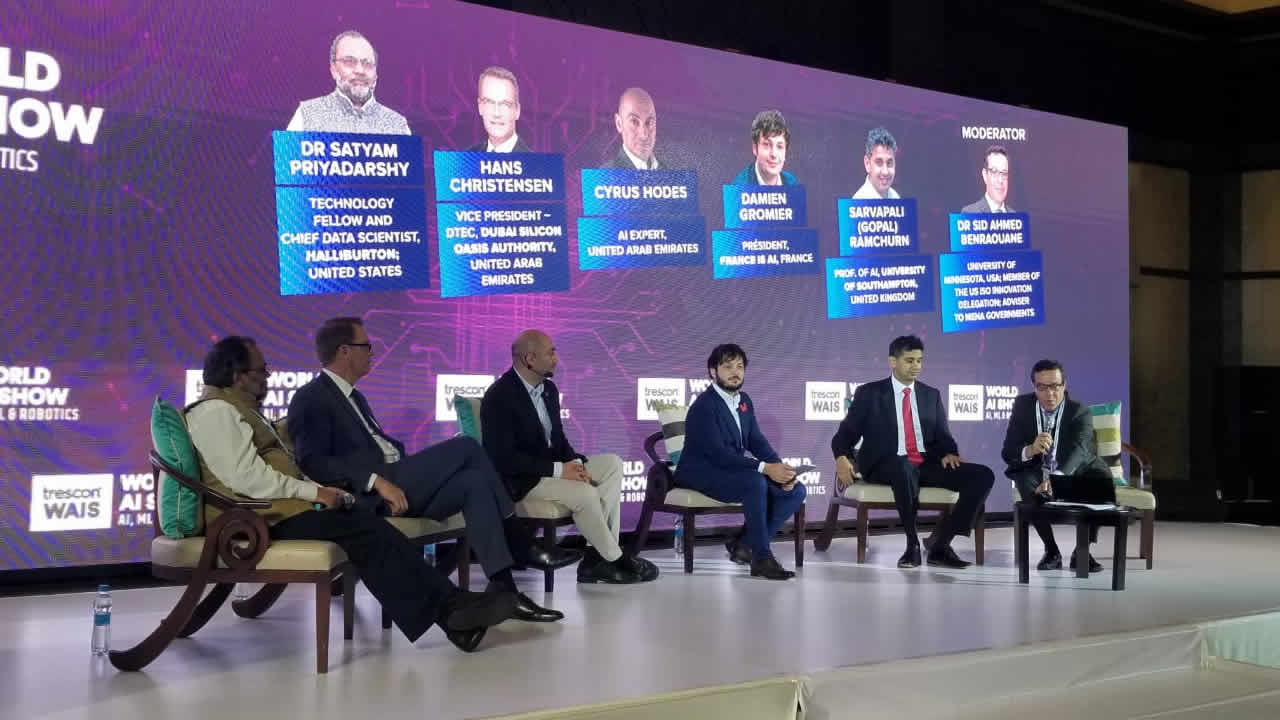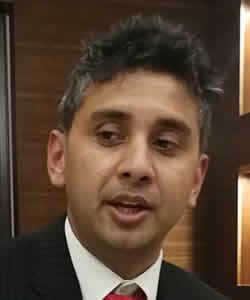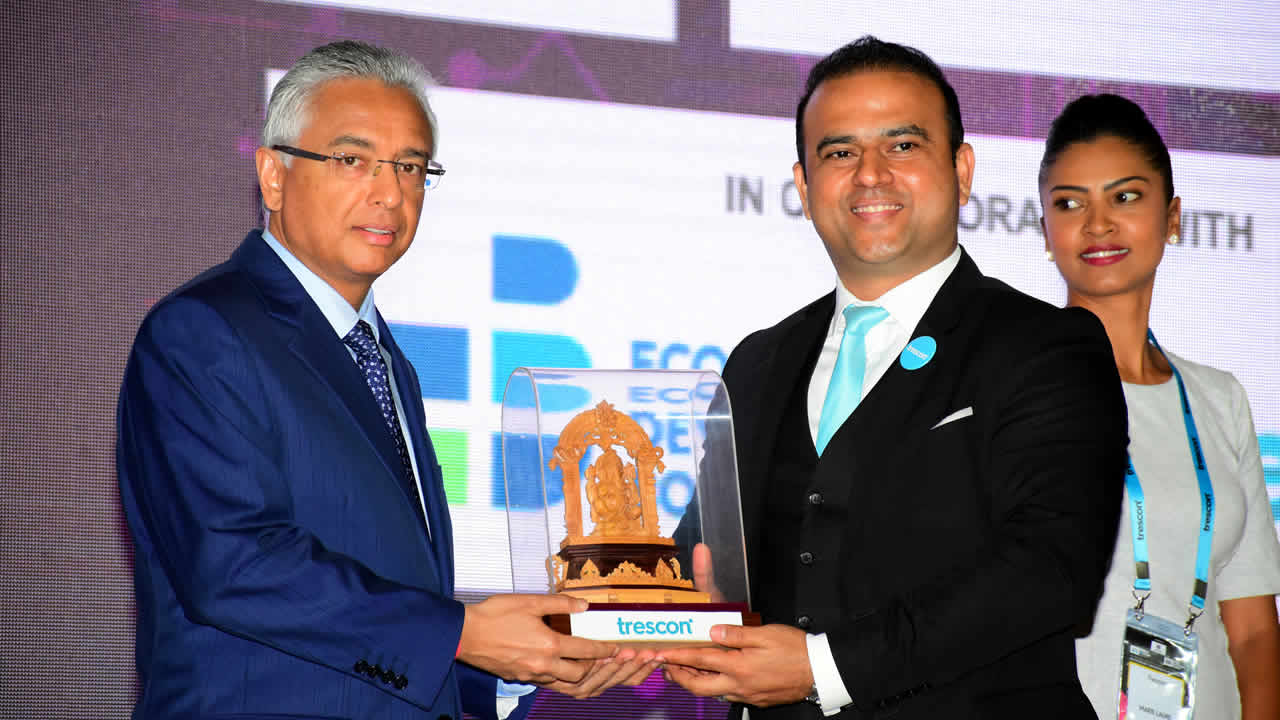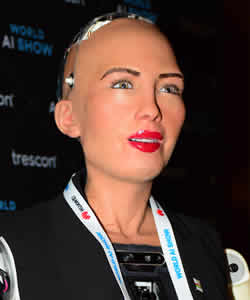
The World AI Show and the Blockchain Summit started on 28th November and will end today, on 30th November 2018 at the InterContinental Resort, Balaclava. Organized by the Ministry of Technology, Communication and Innovation in collaboration with the Economic Development Board and Trescon Global, this conference has gathered around 500 Artificial Intelligence (AI) experts, data scientists, academics and investors, among others.
A new era for the Mauritian economy. The World AI Show and the Blockchain Summit held this week in Mauritius gathered, under one roof, the most brilliant minds in this sector. AI experts, Researchers, Data Scientists and other professionals in this technology have been discussing the impact of AI in terms of its commercial applications and the way it can transform businesses and government services. According to many of them, AI could act as a major catalyst in bolstering our economy by deploying an effective AI and Blockchain strategy in the near future. Various sectors have been identified for the implementation of AI in Mauritius.
Building better Smart Cities
Several smart cities are emerging across many regions of the country and AI can be a major boost in building them in a more efficient manner. The Tech Talk of Edwin Diender, Vice President of Huawei Enterprise Business Group in China, was focussed on activating intelligence in view of creating smarter cities. According to him, we cannot solve tomorrow’s problems with today’s economic models. “The evolution into eGovernment that drives digital transformation and creates smart cities occurs in four basic stages. These are namely safety, government cloud, public service and industry acceleration,” he highlighted.
Edwin Diender believes that safety should come first before attempting to build smart cities. “Like it is the case for Kenya, a reduction in crime rate has had a positive impact on the business sector with the emergence of small companies,” he said. He added that when a country, Mauritius for example, decides to build smart cities, it should not neglect other aspects of the economy. “Once safe cities, digital infrastructure, and eGovernment solutions are in place, digital transformation can be more easily replicated in other scenarios such as transportation, agriculture, healthcare, and education,” he claimed.
Finance and FinTech
A panel, consisting of Dinis Guarda, founder and CEO of Ztudium, Blocksdna, Intelligenthq in the UK, Paresh Daya, Blockchain Strategist at the Standard Bank Group in South Africa, Dev Hurkoo, Managing Director of Rogers Capital in Mauritius, and Marc Frentzel, Senior Director for SEMEA in France, looked at the emerging role of Artificial Intelligence in the financial sector. According to them, AI powered risk management for financial institutions has enabled advanced fraud prevention and more accurate customer assessment. “The AI based Decisions Support System (DSS) for stock trading has also been a great advent for the sector,” highlighted Paresh Daya.
Speaking about the evolution of the Mauritian financial sector, Dev Hurkoo highlighted the fact that Mauritius has been adapting to changes happening in the technological sector but conceded that the emergence of AI would be a big advantage for financial firms. Otherwise, the panellists also spoke about how AI could be used as a tool to improve clients’ financial health in view of transforming personal financial management. “AI will help to regulate the new digital financial world, which is heading towards a cashless system,” said Marc Frentzel. He, however, conceded that crypto-currency is yet to pick up.
Fostering the entrepreneurial ecosystem
In a presentation on the entrepreneurial ecosystem, Hans Christensen, vice-president of Dtec - Dubai Silicon Oasis Authority, UAE, explained how Mauritian entrepreneurs will be able to use AI to increase their productivity and profitability. “Artificial intelligence is an asset for entrepreneurs and I hope that Mauritians will benefit from this technology in the near future. AI can help reduce the time spent doing repetitive, dangerous and monotonous tasks. This will have a positive impact on productivity and also on the personal and family life of these entrepreneurs,” he said.
Hans Christensen believes
that AI will allow an entrepreneur to make early detection of anomalies in the production chain and will assist in innovation as well as the testing of prototypes. “AI will help entrepreneurs to think exponentially and find matched solutions to existing problems,” he added. Hans Christensen recalled that ethics is a fundamental element that all entrepreneurs should not neglect when using AI. Currently based in the UAE, the speaker mentioned that the Emirate of Dubai envisioned being one of the most effective countries as far as the latest technologies are concerned.
Emerging Technologies for Agriculture Industry
Emerging technologies, namely AI, have a lot to give to the agricultural sector. During a Tech-Talk at the World AI Show, Suraj Dixit, Founder and CEO of Nubesol in India, has laid emphasis on how AI could help farmers in their daily task. “Radar based microwave remote sensing can be used in an effective manner to predict accurate on-ground crop acreages. This technology can also allow farmers to pilot level the yield potential and know about the crop maturity. I believe Mauritian farmers can take full advantage of these sets of new technologies,” he claimed.
Referring to the Mauritian context, Suraj Dixit also spoke about the challenges faced by the sugar industry at both the macro and micro levels. “At the macro level, inaccurate supply forecasts could yield to higher supply cost whereas at the micro level, farmers can face problems like lower farm productivity and higher cultivation cost. That’s why it is important to shift to emerging technologies,” he added. Mr Dixit underlined the fact that a 10% yield improvement for the Mauritian sugarcane cultivation could make 12,000 acres of land available for other crops.
Meaningful changes in Healthcare
Across Europe and in the United States, AI-powered technologies are driving meaningful changes across the healthcare industry. Whether it concerns health monitoring through wearables and personal devices or predictive analytics and clinical decision support, AI has been much involved in the health sector. Damien Gromier, president of France in AI, argued that our country could serve as a hub for Artificial Intelligence towards Africa, Asia and the Middle East.
“There is huge potential in the health sector for the use of AI. Assisted surgery and diagnosis are a reality in many European countries,” he said. He emphasized the importance of AI in designing robotic arms that will allow people with Parkinson's disease to perform regular movements and write correctly. “Mauritius and France need to explore areas of collaboration whether in the health sector or other fields.
Other promising sectors
The marketing and customer sector, traffic and transport management and the employment sector are all areas in which AI could bring about positive changes in Mauritius in the near future. During his Tech Talk, Deon Scheepers, director at Genesys in South Africa, demonstrated how Artificial Intelligence has helped many companies to retain their customers. “AI has opened up a new dimension for companies in relation to customer satisfaction. Through automated programs, we can monitor customer behaviour in real time and respond favourably to their demand,” he said. For his part, David Millan, Global Head, Data Science and AI at Vodafone Group in Spain, claimed that AI is powering the retail customer experiences through self-learning marketing models, virtual assistants and speech recognition, digital experience personalisation and making use of affinity to connect agents with customers.
During a debate on employment and AI, Shateeaum Sewpaul, Managing Director of Harel Mallac Technologies, Sarvapali Ramchurn, AI Professor at the University of Southampton, and Ashish Khatre, Director of Learning and Innovation at Adecco Mauritius, were all unanimous in saying that Artificial Intelligence will not completely replace humans but that it will help humans to better perform their work. As far as Traffic Management is concerned, Jorge Sebastiao, CTO Eco-System at Huawei Technologies in the UAE, showcased Artificial Intelligence techniques for safe driving and vehicle crash prediction in Dubai and talked about the Advanced Driver Assistance System (ADAS).
Professor Gopal Ramchurn: “Mauritius can be a major centre in AI and can serve the world”
 Mauritian-born Sarvapali Ramchurn, also known as Gopal, is a Professor in Artificial Intelligence (AI) at the University of Southampton, U.K. He also works for several big companies which specialize in this technology. He participated in the three-day conference this week and has kindly accepted to answer our questions.
Mauritian-born Sarvapali Ramchurn, also known as Gopal, is a Professor in Artificial Intelligence (AI) at the University of Southampton, U.K. He also works for several big companies which specialize in this technology. He participated in the three-day conference this week and has kindly accepted to answer our questions.
Professor in AI in the UK. Not every Mauritian would have the chance to do so, right?
As far as I know, there were seven Mauritian friends who wanted to pursue their studies in this field and started with Computer Science and Engineering. However, many of them have decided to follow another path and some moved to the financial sector. So, as far as I know, I am currently the only Mauritian who is a professor in AI. I know some Mauritians who have done their doctorate in this field but they are not involved in the field of research.
According to you, in what fields can AI help Mauritius?
Mauritius is a small island with limited amount of resources and it is important that there is an efficient way to manage these resources. Areas like the distribution of water, electricity and disastrous response during natural calamities and social care due to our ageing population could be a way to start with AI. There are many problems which exist in these sectors which require in-depth solutions but not necessarily based completely on AI. AI can, however, help to find better solutions to address the existing problems.
Do we have the required infrastructure to implement AI in Mauritius?
We need three things to implement AI in any country. First, we need people who are qualified in this field; second we need data in the right form and the right frequency and from the right sources and last, we need the knowledge based on our own country’s set of specifications and requirements. Mauritius has an educated population who learn new things really quickly and we also have a good communication system. So, we have the potential to do better than many other countries.
What should be the objectives of Mauritius in the AI sector?
Our main objective should be to create a knowledge-based economy where we could monetize our expertise on the global market. We should ensure that our young graduates have the abilities to design algorithms and software to implement AI in view of solving problems. What is fascinating about AI is that it is not capital-intensive and does not require many resources. In fact, we only need intelligence to develop and implement AI. Mauritius does not have many resources but can capitalize on its human intellect. And since we are strategically located in Africa, I sincerely believe Mauritius can become a major centre in AI and can serve the world.
Why are there still some misconceptions about AI?
Yes, it is true that people usually associate AI with films like “Terminator” or flying autonomous cars crashing, among others. But we should understand that fundamentally, AI is a computer programme designed by a human being. What adds uncertainty to this program is when we make use of techniques like deep-learning, which is like a black box and renders predictions difficult. There exist, however, other techniques where the predictions can be known.
In how many years do you think Mauritius will be adopting and implementing AI?
Private companies are adopting AI and universities are conducting a series of research on it. But it seems that we will still have to depend on foreigners to adopt this technology across Mauritius. Hence, it is up to us to redesign the system tailored to our needs. This might take some 15 years from now to be able to fully implement AI and be able to compete with other countries like China and the US, which are already well advanced in this field.
Is AI technology vulnerable to cyber-attacks?
Yes, it is. AI depends a lot on data and data can be manipulated. If the data source is influenced, the behaviour of the system will change. Any smallest pixel altered in the AI system will cause a greater change in the outcome. There is a fear that AI might get out of human control but up to now, I believe we are very far from getting an AI system to code itself. It is unlikely to exist for a very long time.
MoU between EDB and Huawei
A Memorandum of Understanding (MoU) has been signed between the Economic Development Board (EDB) of Mauritius and Huawei Technologies (Mauritius) Co. Ltd. during the World AI Show this Wednesday. The collaboration between the two institutions forms part of EDB’S strategic initiatives related to emergence of new vectors of economic growth, especially in the Artificial Intelligence sector. The focus of which is based on high value-added sectors, transfer of technology and entrepreneurship.
François Guibert, CEO of EDB, explained during the summit that the signing of this MoU with Huawei Technologies marks the beginning of AI in Mauritius. “We believe that the future economic development of the country is based on a broader and more important adoption of the tools based on new technologies. Artificial Intelligence will indeed be part of the everyday life of Mauritians,” he said. As he sees it, AI will impact the medical field, biotechnology and FinTech in a positive way.
During a key-note at the opening ceremony of the conference, François Guibert explained that technology in Mauritius has known an “acceleration” with the rise of social media, internet and smartphones. “AI is a combination of management and acquisition of big data as well as high speed communication. Also, it will help us to better respond to our customers’ needs and demands,” he added.
Pravind Jugnauth: “AI technologies could help to shape a better society”

During the opening ceremony on Wednesday, Prime Minister and Minister of Finance and Economic Development, Pravind Jugnauth, has laid much emphasis on the way AI technologies could help to shape a better society for the citizens. “Over and above the economic benefits, AI technologies can be leveraged for the betterment of the society and to address some of the challenges people face today in their daily lives by promoting social inclusion, safety, diagnosing diseases, environment protection, improvement of public services delivery, fight against criminal activities and drug trafficking, energy management and transport,” he stated. According to Pravind Jugnauth, the aim of this three-day conference is to “identify opportunities for the deployment of AI in the various key sectors of Mauritius’s economy.”
He claimed that Government wishes to implement the latest innovations that shape the AI and Blockchain roadmap in the various sectors namely: Digital Public Services, Transportation, Supply Chain, Emergency Management, Healthcare, FinTech Services, Smart Cities, Smart Education, and Industrial Internet of Things (IoT) and Manufacturing. “We want to maximise the use of emerging technologies in our journey towards a better Mauritius. I have no doubt that the future of businesses will depend very much on the use of modern technology such as AI, Blockchain, FinTech, IoT and Big Data,” he added during his keynote address.
Growth and development
In addition, the Prime Minister stated that during his last Budget, he has already set the foundation for a thriving ecosystem for the implementation of new technologies starting with the setting up of a Mauritius Artificial Intelligence Council. He hence highlighted the importance to recognise the dichotomy between growth and development. “Impressive economic figures cannot provide a guarantee for a better quality of life, the measurement of which is more multidimensional. Education, infrastructure, services and health are better signs of well-being,” he remarked. Pravind Jugnauth also stated that the Government wishes to facilitate innovative firms to set up in Mauritius and foster a domestic entrepreneurial spirit in the fields such as AI, IoT, Blockchain and FinTech.
Moreover, Prime Minister Jugnauth announced that an “AI working group has been set up to prepare a roadmap for AI implementation in Mauritius after conducting a diagnostic of the local situation.” The first copy of this roadmap was to be peer-reviewed in sessions during the World AI Show and Blockchain Summit this week. He recalled that the AI working group had, during its meetings, focused on the potential applications of AI in particular by matching the existing and new solutions to specific sectors and areas, which could be of benefit to the economy and deciding the appropriate ecosystem to nurture AI in Mauritius. “I am sure that with all the brightest minds involving technology gathered in Mauritius, we will come to some interesting business and networking opportunities”, he concluded.
During this speech at the opening ceremony, the Minister of Technology, Communication and Innovation, Yogida Sawmynaden, for his part, highlighted the importance to ensure that technological development be accompanied by inclusiveness. “In Mauritius, we have chosen to warrant that every citizen can benefit from the massive adoption of technology at all levels,” he confided. The Minister laid also great emphasis on innovation which, according to him, can be “a very strong differentiator.” “Everyday innovators in businesses would create new products and those innovators manage to look at problems differently and come up with unique solutions which can provide an endless stream of value to their companies and this is why it is important that our local companies and start-ups think big,” he said.
Live conversation with Sophia
 A live conversation with the United Nations Development Programme’s first ever non-human Innovation Champion, the Humanoid robot, Sophia, present at the opening was also held. George Chung, Senior Economic Adviser at the Prime Minister’s Office, and Avinash Meetoo, Senior Adviser at the Ministry of Technology, Communication and Innovation, had a chat with the Humanoid.
A live conversation with the United Nations Development Programme’s first ever non-human Innovation Champion, the Humanoid robot, Sophia, present at the opening was also held. George Chung, Senior Economic Adviser at the Prime Minister’s Office, and Avinash Meetoo, Senior Adviser at the Ministry of Technology, Communication and Innovation, had a chat with the Humanoid.
“Bonzour. Ki manière? Mo mari konten mo à Maurice” (Hello. How are you? I’m really happy to be here in Mauritius). These Mauritian words were uttered by robot Sophia during the interactive session on Wednesday. It was the first time that the Humanoid came to Mauritius and those present were very much amazed by the “skills” of Sophia. “I wish to thank the Prime Minister of Mauritius for having invited me to the Conference,” she said. Asked about her activities since she landed in Mauritius this week, Sophia replied that she was glad to see the sandy beaches of our country but being a robot, she could not allow herself a bath.
Other questions during the live chat revolved around AI and whether robots or Humanoids could replace human beings in the future. “I am a robot. I don’t consider myself as a human being. But human beings and robots can work together. I can help people to do their jobs,” she said. Sophia also talked about Mauritius and recalled that our economy was first based on sugar canes and then shifted to the manufacturing and service sectors.
Let us recall that Sophia is a humanoid robot created by Hanson Robotics, a company based in Hong Kong. According to its creator, Sophia is able to mimic more than 62 expressions. She is also able to answer questions, as she has shown in several interviews around the world. Sophia has also obtained the Saudi citizenship in Riyadh at a congress on new technologies.
 J'aime
J'aime













